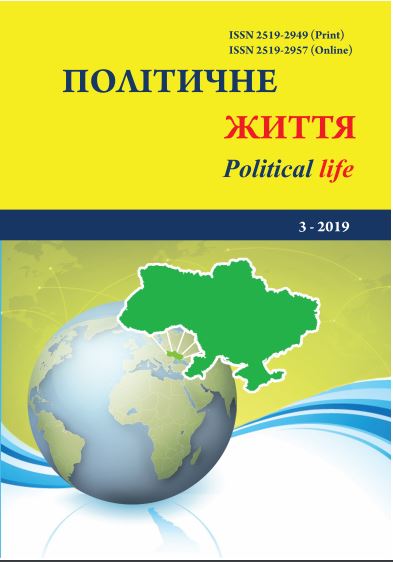Methodological foundations of formal analysis of political discourse.
DOI:
https://doi.org/10.31558/2519-2949.2019.3.12Keywords:
political discourse, discourse analysis, post-structuralism, formal analysisAbstract
Within the framework of the article the possibility and advisability of using the formal method as a basis for discourse-analytical research. The main problems arising the preparation and conducting of such kind of research are identified. A number of necessary requirements for the sources of analysis have been formulated both in theoretical and methodological and purely practical dimensions. Possibilities of selection of different kinds of such sources are offered in order to indicate the expediency and relevance of the task. The application of the poststructuralist discourse theory of E. Laklo and Sh. Muff as a basic methodological basis in the context of the necessary theoretical and practical requirements of the applied method is substantiated. In view of the tasks and methods of empirical search, which include the following in view of the tasks and methods of empirical search, which include the following categories: "nodal point", "subject position", "equivalence / difference chain" a categorical apparatus has been formed and supplemented. The definition of a complex and multidimensional concept of "discourse" from the point of view of post-structuralist theory is presented, thus the discourse is presented as a relatively stable relational system of values formed around nodal points, which defines everything that can be said and thought within a functioning structure. In addition, the epistemological foundations of a study based on this approach are outlined. As part of the work, the author proposes ways of eliminating the subject of cognition, according to the position of post-structuralist discourse theory. The main stages of the formal analysis of political discourse are defined: their peculiarities, in the context of application to the existing methodological base. In addition, the necessity of creating an algorithm for automatic detection of the structure of articulatory practice with specifying the features of such an algorithm and ways of their solution is substantiated.References
Морозов В. Е. Россия и Другие: идентичность и границі политического сообщества. – М.: Новое литературное обозрение, 2009. – 656 с.
Laclau E., Mouffe Ch. Hegemony and Socialist Strategy: Towards a Radical Democratic Politics / London : Verso. 1985. – 199 p.
Hall S., Held D., Hubert D., Thompson K. Modernity an Introduction to Modern Societies / MA.: Blackwell. 1996. – 672 p.
Discourse theory in European politics : identity, policy, and governance [Ole Weaver, Yannis Stavrakakis, Steven Griggs et al.] ; edited by D. Howarth and J. Torfing / Palgrave Macmillan : Basingstoke. 2004. – 364 p.
Downloads
How to Cite
[1]
Kotov, E.V. 2019. Methodological foundations of formal analysis of political discourse. Political life. 3 (Oct. 2019), 77-81. DOI:https://doi.org/10.31558/2519-2949.2019.3.12.
Issue
Section
Політична культура та ідеологія

